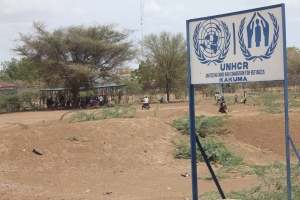UNHCR interpreters went on protest demanding a raise on the incentive payment.
On the morning of 14 July 2014, at least 32 refugee workers at the protection unit of the UNHCR Sub-Office at Kakuma went on a calm protest. The protesters refused to report to work on the material day and gathered inside the interpreters’ office in the UN premises for about two hours before being addressed by protection officials.
The group comprising the eligibility and registration interpreters faced a tough screening of their complaints by protection lawyers and the head of the Group 4 Security (G4S) officer at the compound.
The group grievances are low monthly payment, unprocedural deduction of incentive payments during public holidays, lack of transport to and from work and other hardships. According to the refugee workers interviewed by KANERE, they faced threats to cut their employment if they continue to protest.

The vetting process was described as unfair. The UNHCR officials only prepared conditional questions and asked the refugee staff to answer either “Yes or No”. “Do you want to work with the UNHCR?” was the only question during the vetting.
The refugee interpreters lined up for the vetting which took about one hour that led to seven interpreters losing work because they simply responded “No” during the test.
The seven interpreters all of whom are South Sudanese nationals have claimed that they were chased out of the Agency’s compound and their jobs were cut immediately. “We answered ‘No’ to the radical question from the lawyers and we’re immediately forced to the entrance and denied entry that afternoon” said K. Mabior, a former interpreter. “We’re not give a chance to express ourselves, this is not the UNHCR that the world thinks of” Mabior added.
Efforts to reach the UNHCR Head of Sub-office were not successful despite several attempts by KANERE.
The actual monthly payment for the refugee workers with UNHCR in Kakuma is as low as Kenyan shilling 5,500 or $64 per month. In Dadaab refugee camp the interpreters are paid more than 10,000 Kenyan shilling or $117 per month. Refugee interpreters in Kakuma believe that UNHCR is not working equally with the refugees’ terms of employment as provided by the Refugee Act, 2006.
“Subject to this Act, every recognized refugee and every member of his family in Kenya – shall be entitled to the rights and be subject to the obligations contained in the international conventions to which Kenya is party.” Article 16 – 1A, of Refugee Act.
In Kakuma although UNHCR oversees the incentive policy for work outside normal hours among the NGOs where this has been established, the payment rates are not harmonized. Hence UNHCR violates the refugee rights on just employment conditions under international human rights law.
The Universal Declaration of Human Rights (UDHR) guarantees to everyone “Just and favorable conditions of work.” It states that “everyone, without any discrimination, has the right to equal pay for equal work” (Article 23: 1 – 2) The right to work is also supported by Article 6 of the International Covenant on Social, Economical, and Cultural Rights (ICSECR)
Refugee workers under the umbrella of UNHCR have strongly expressed dissatisfaction and complained of violation of their employment rights. The refugees complained of greater workloads and longer working hours, even more than those of national and international staff in some cases.
However, a more in-depth analysis of the problems facing the interpreters and refugee workers under UNHCR will be reported in a subsequent issue of KANERE.
In the mean time, we are asking refugee humanitarian workers to use KANERE as a platform for dialogue and debate on the situation of refugee workers in the camps.

1 reply on “Refugee Interpreters in Protest”
UNHCR kakuma is a task oriented organization and not both people and task oriented organization as one think in other part of the world. I don’t believe if UNHCR has employed the right persons here at kakuma refugee camp. No equal rights being observed. No equal payment being observed too. Every-things remains in mess. Refugees are not human beings in the eyes of other humanitarians staff at kakuma. No sufficient protection given to refugees. Policemen are torturing refugees anyhow in the camp and no one is answerable to that brutal act. UNHCR protection lawyers have failed their duties in that profession. Let them quit the job and give chance to others who may be of help to refugees in the camp.